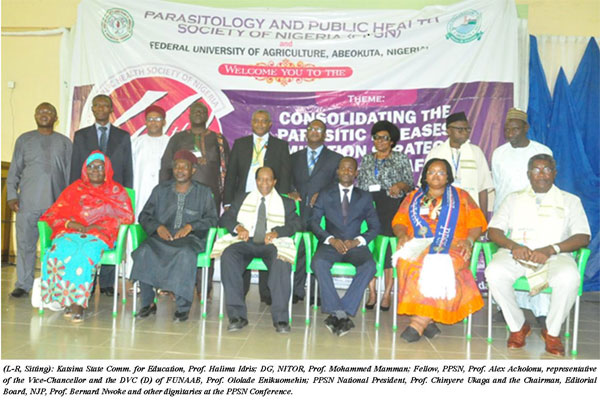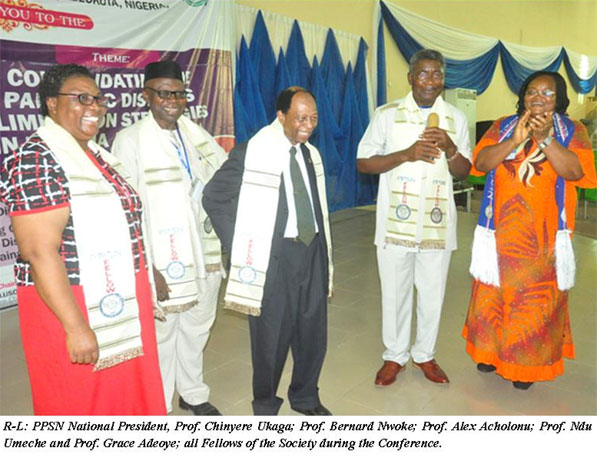The University recently hosted the 40th edition of the Parasitology and Public Health Society of Nigeria (PPSN) Conference and Annual General Meeting (AGM), with the theme “Consolidating the Parasitic Diseases Elimination Strategies in Nigeria and Africa”.


The Keynote Speaker and the Director-General, National Institute for Trypanosomiasis and Onchocerciasis Research (NITR), Kaduna, Professor Mohammad Mamman, stated that more than one billion people were affected with one or more neglected tropical diseases, adding that the ailment remained abandoned at all levels, as he highlighted 17 neglected diseases caused by micro and macro parasites such as Buruli ulcer, Chagas diseases, Dengue Leishmaniasis, Leprosy, Human African Trypanosomiasis, Rabies, Trachoma, Treponematoses, Cysticerosis and Dracunculiasis. According to him, Nigeria had the highest prevalence of these Neglected Tropical Diseases (NTDs), noting that the theme for the conference was apt and timely because of the growing impact of pathogens on human health.
Professor Mamman stressed the benefits of One Health, which is an integrated approach to collectively improve human, animal and environmental health, saying that some successful disease control, based on One Health collaboration, included controls of small pox, human tuberculosis, human rabies and maintenance of normal blood glucose levels, among others. According to him, the objective of One Health was to promote co-equal and all-inclusive collaborations between physicians, Osteopathic physicians, veterinarians, dentists, nurses, disease control centres, agriculture-related regulatory agencies, public health departments and other science-based health and environmental disciplines.
He noted that the One Health Concept could be used to consolidate the parasitic disease elimination strategies in Nigeria, by first assessing the existing strategies for health control and elimination of parasitic diseases on the continent. Alluding to the words of Gardon B. Hinckley, the erudite scholar, who once said that “you can’t build a great building on a weak foundation”, noted that the adoption of One Health Initiative for the control and elimination of human and parasitic diseases in Africa was depended on the availability of sound health infrastructure, strong commitment by government, formulation and implementation of policies on disease control, critical mass of experts as well as the alignment of African countries to actively participate in the cause.
Declaring the conference open, the Vice-Chancellor, Professor Olusola Oyewole, who was represented by the Deputy Vice-Chancellor, Development, Professor Ololade Enikuomehin, appreciated the Society for the privilege given for FUNAAB to host the conference. He challenged the parasitologists to work together to eliminate parasitology-related diseases in Nigeria and Africa because there was the need to balance between literacy, cultural practices and norms as it applied to parasitology, noting that indigenous practices could be fine-tuned to suite modern practice, which would lead to solutions, particularly, the environment.
The President of PPSN, Professor Chinyere Ukaga, had stated that there were great expectations of a better conferencing when compared with the last one held in Lafia, Nasarawa State. She recalled that the establishment of the Society took place in Calabar in 1973 and was formerly known as the Nigerian Society for Parasitology (NSP), with limited membership across the six Nigerian universities, adding that the main agenda of the body was to develop parasitology that responded to African needs and training others for research and service.
Professor Ukaga disclosed further that earlier in 2016, reports of outbreaks of Lassa Fever in various parts of the country, as well as Bird flu in the Plateau region, were recorded while zonal coordinators responded to the clarion call to set up different programmes in response to diseases. She, therefore, paid glowing tributes to the immediate past Zonal Coordinator of the North-East Zone, late Dr. Steve Tidi, who passed on recently. The President also appreciated those who worked hard editorially, under the leadership of Prof. Sammy Sam-Wobo of FUNAAB, the Editor-in-Chief, to ensure that the Nigerian Journal of Parasitology (NJP), ranked second among all other African journals.
Professor Alex Acholonu of the Alcorn State University, Mississippi, United States of America (USA) had described parasitology as the study of parasitism or the study of parasites, saying that it was an essential subject in tropical Nigeria. According to him, parasitism is a way of life in which one specie (parasite) lives on another specie (the host), while gaining its livelihood at the expense of the host. The Professor of Biology stated that there was the need for more research on parasitology, particularly, in the area of common and unknown organisms such as the pentastomes and Acanthocephalans. Meanwhile, Professor Acholonu was redecorated as the founding member of the Society as well as Fellow of PPSN at the occasion.
